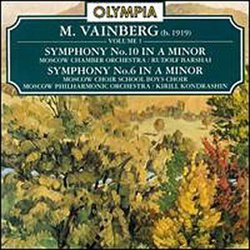| All Artists: Vainberg, Barshai, Moscow Chamber Orch Title: Vainberg 1 Members Wishing: 0 Total Copies: 0 Label: Olympia Release Date: 6/20/1996 Genre: Classical Styles: Historical Periods, Modern, 20th, & 21st Century, Symphonies Number of Discs: 1 SwapaCD Credits: 1 UPCs: 515524004712, 723721898922 |
Search - Vainberg, Barshai, Moscow Chamber Orch :: Vainberg 1
 | Vainberg, Barshai, Moscow Chamber Orch Vainberg 1 Genre: Classical
|
Larger Image |
CD Details |
CD ReviewsGreat symphonies, outstanding performances! JRL | France | 02/15/2008 (5 out of 5 stars) "Miecczylaw Weinberg (1919 - 1996) was born in Warsaw. His father was a composer and violinist at a Jewish theatre of the city, and he studied piano at the Conservatory with Josef Turczynski. In 1939 he fled from the Germans, and went to USSR. There he was later to discover that his parents and sister, who had remained in Poland, had been burn alive by the Nazis. He first attended composition classes at the Minsk Conservatory for two years, as a pupil of Vassily Zolotaryov (1872 - 1964), who in turn has study with Mily Balakirev and Nikolai Rimsky-Korsakov. Mahler and Prokofiev were important rôle models. In 1941, because of the attack on Russia, Weinberg had to flee in Tashkent, Uzbekistan, but, in 1943, he sent the score of his recently completed Symphony N° 1 to Shostakovich, who responded enthusiastically, inviting him to Moscow, where Weinberg was to remain as a free-lance composer until his death.
Symphony N° 6 in A minor takes up with the fate of the Jews, with the tragedy of the orphans and of infanticide as its central concern. This explains why the scoring calls for children's choir. There is a remarkable time connection with the Shostakovich thirteenth symphony "Baby-Yar", with texts on related themes by Yevgeni Yevtushenko (born 1933), which were written at virtually the same time; this may not be a coincidence, as it has been proved that the two composers often provided inspiration for each other. The textual basis of the Weinberg's work consists of three poems, one from Lev Kvitko (1890 - 1952), one from Samuil Galkin (1897 - 1960) and the last one from Mikhail Lukonin (born 1918); they form a clearly shaped dramatic arch. All three texts are in Russian, the first two marked "Translation from the Yiddish". The symphony is scored for a very large orchestra, which includes an extensive percussion section. Shortly after the premiere, which occurred in 1963, Shostakovich wrote to a fellow composer: "If Vainberg`s sixth Symphony is played in Leningrad, you really must hear it. I heard it yesterday and was deeply impressed." Weinberg's Symphony N° 10 in A minor was written in 1968, and the composer limited himself to a chamber orchestra, as on several previous occasions, for instance in Symphony N° 2 and Symphony N° 7. In 1969, Shostakovich wrote to a friend: "If Barshai's orchestra makes a guest appearance in Leningrad, playing Vainberg's Tenth Symphony and Boris Tchaikovsky's Sinfonietta, you really have to hear them. In general, you ought to watch for both of these composers." Both works were recorded in the Grand Hall of the Moscow Conservatoire, respectively in 1974 / Stereo and in 1970 / Mono." |

 Track Listings (5) - Disc #1
Track Listings (5) - Disc #1